TM/9/8/10-16 Epigrams on the state of the “Bogs” (toilets) at Caius, Cambridge
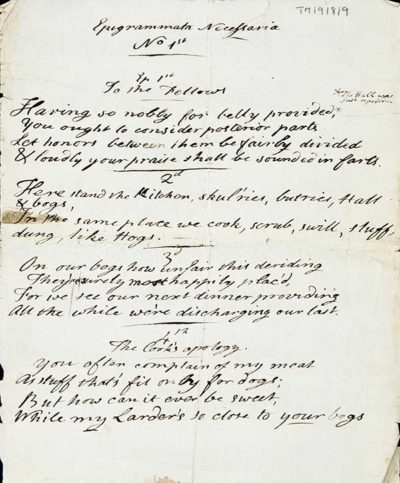
16 Epigrams on the state of the “Bogs” (toilets) at Caius, Cambridge. Undated [1799] Handwritten, 5 pieces, 5 sides
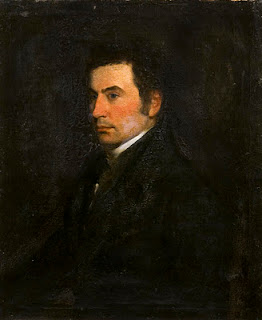
Thomas Manning was born in Broome, Norfolk on 8th November, 1772, the second son of Reverend William Manning, rector of Broome and subsequently rector of Diss, Norfolk, and his wife, Elizabeth, the only child of Reverend William Adams, rector of Rollesby Norfolk. Thomas Manning was educated locally and was admitted to Gonville and Caius College, Cambridge in 1790 to study mathematics. Manning was very able but did not graduate as he refused to subscribe to the Thirty-Nine Articles of the Church of England. Manning continued in Cambridge tutoring students and published his Introduction to Arithmetic and Algebra in two volumes between 1796 and 1798. Manning became interested in China and the Chinese language and in January 1802, sailed from Dover to stay in Paris where he met and studied with Dr Hagar at the Bibliotheque Nationale. Manning intended to stay in Paris for two years but was detained further due to the outbreak of war with England. He returned to England in January 1805 and studied medicine for six months at Westminster Hospital with the intent of gaining a practical skill to aid his travels. Manning first thought of trying to reach China overland via Russia but felt that his language skills were insufficient and therefore applied to the East India Company for permission to reside in their premises in the trading port of Canton, China. He sailed on the Thames in May 1806, arriving in Canton later that year. Manning lived within the East India Company premises and helped with medical matters and translation. He was frustrated by lack of access to the interior of China. He joined a surveying expedition to Cochinchina (Vietnam) in 1808, after which he returned to Canton. Manning then decided to attempt to reach the interior of China via Tibet. For this purpose he sailed to Bengal. He became known in Calcutta for his flowing beard and Asiatic costume. He was delayed waiting for official permission to travel through Bhutan and in the end set off with one Chinese servant, entering Bhutan in September 1811 and Tibet later that year. He travelled with Chinese soldiers and treated their medical ailments. He reached Lhasa in December 1811 and was allowed an audience with the Dalai Lama. However he was not able to continue further inland and was sent back to Calcutta in 1812. From there he returned to Canton where he continued his studies until joining the Amherst Embassy as a translator in 1816, after which he set off for England with the Embassy on the Alceste. This was wrecked on 17 February 1817 and he continued on the Caesar. He reached St Helena in July 1817 and enjoyed an audience with Napoleon who was then imprisoned on the island. Manning returned and settled in England, aside from a spell in Italy between 1827 and 1829. Afterwards he returned to England and lived in obscurity in Kent until 1838. A stroke disabled his right hand, after which he moved to Bath to benefit from the medical treatments. He died at Bath on 2 May, 1840 and was buried in Bath Abbey Church.

16 Epigrams on the state of the “Bogs” (toilets) at Caius, Cambridge. Undated [1799] Handwritten, 5 pieces, 5 sides
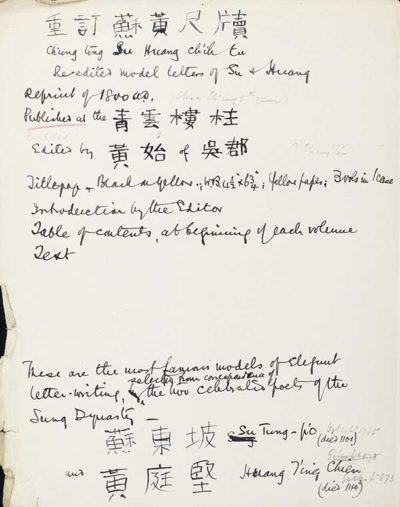
Handwritten catalogue of the Books of Thomas Manning that were in the Chinese Collection of the RAS Library. Each item…
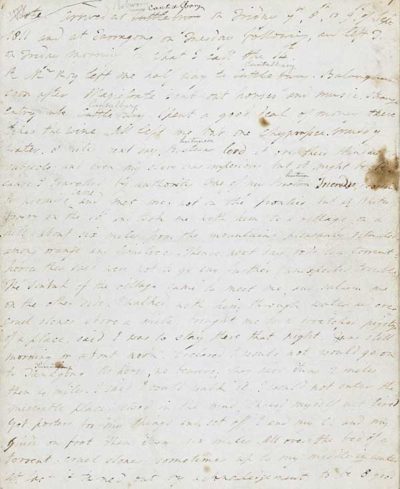
Manuscript of “Narrative of the Journey of Thomas Manning to Lhasa”. Handwritten MS prepared by [Manning’s sister] on paper watermarked…
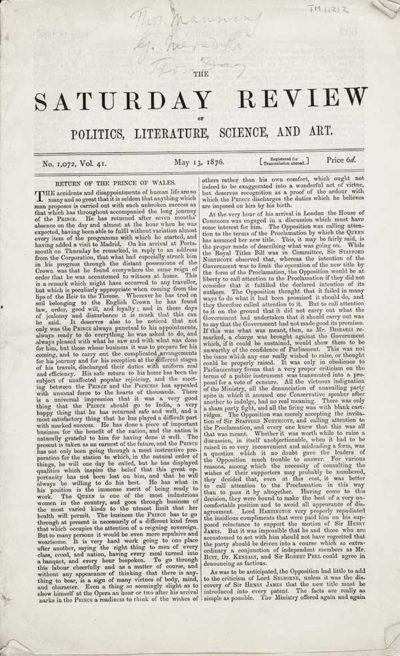
Portsmouth Telegraph or Motley’s Naval and Military Journal. This is a Centenary copy dated 14 October 1899 for the issue…
